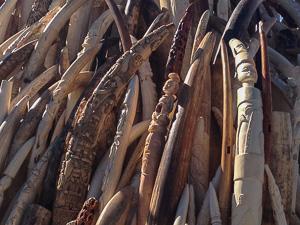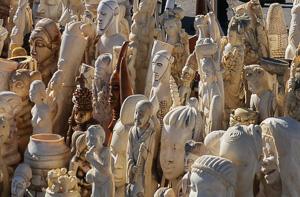

It is indeed an epochal moment. When "civilization" was fighting itself during World War I and II, humans had barely begun to fathom the frailty and extraordinary complexity of the life force on earth. How can we be setting our sights on Mars and looking for extraterrestrial life when the sights of high- powered rifles are bringing down one of the supreme pillars of the world? The legacy of what humans are doing to the biosphere is the ethical, biological and spiritual equivalent of WWIII.
At the ivory crush, attention was focused on the tusks of beings that possess brains six times larger than ours, who are potentially telepathic, whose mourning process should humble us in its sentient core, whose processions are the paragon of the earth's terrestrial pageantry, and whose place on earth for sheer coherence and equipoise should inspire us all. Security guards were stationed everywhere, watching over a crowd that had come to pay their respect for the dead. Unlike the ivory burn in Kenya in 1989, no one in the larger world witnessed this secluded rite of passage. It came and went with hardly anyone taking heed of the event's grim message.

Will the message of the recent ivory crush recede after the media fanfare? Our eight-year-old son Lysander, like so many children around the world, has read the story of Babar, the curious elephant who, after escaping a vicious hunter, travels the world in search of the benefits of civilization. Children have been brought up with the story of elephants and other species that form the chorus of childhood. Lysander, who has seen elephants in the wild, knows what is at stake. The only child there at the ceremony, he heard the pulverizing sound of tusks being disintegrated into unrecognizable ivory chips and powder. He was the only one of his generation bearing witness to this crisis that harbors the moral compass of our species.
But how many other American children know the realities of what is happening? How many African children? How many Chinese children have seen the ineffable march of the supreme titan on earth? Their parents will have to explain how the elephants, before humanity emerged on the open savannahs, were reduced to emblems of vanity, ignorance and bloodlust. Lysander, watching tens of thousands of inert baubles in a glass crate filled to the brim like a house of horrors foreshadowing extinction, astutely remarked how many elephant statues were there lying like dead, inert figurines. Were these lifeless trinkets worth the screams and blood of orphaned elephants? What does he see that the adult world does not?
Virgil, in the Aeneid, wrote that the gate of ivory in the story was the doorway of lies and deception. The gate is still here on earth, and it is not the only lie. There, at the bottom of the oceans, the water world of life is in a state of emergency. Jelly fish are conquering the world's seas. Coral, fish, the great marauding sharks, the entire pantheon of evolution, is in jeopardy. We are unique on earth to walk upright, and yet we grovel for the world's resources like feral scavengers. In fewer than 10 years, the true monarch of modern terrestrial life could become a memory, like the gargantuan dinosaurs of yore. If this moment should pass unanswered, the gavel of history will have made its final thunderous judgment.

The ivory crush may be a small historical moment, but in the American mind, the same mind that almost obliterated the buffalo, it should be remembered as global alarm call for the planet. The United States, although hard to believe, is the second largest consumer of ivory in the world. We are shooting wolves mercilessly, wolves that were barely brought back from the brink only a few years ago. We decimated and destroyed the passenger pigeon. Our sonars still terrorize whales across the Seven Seas. Together with China, we have been the greatest contributors to climate havoc. Now is the time to mend our ways. The evidence of the slow passing away of a species' cultural and biological legacy can no longer be ignored.
The dust of genocide's ghost wafted into the atmosphere the day we demolished that ivory. Particles of the world's most stupendous terrestrial species lifted into the clouds and into the stratosphere, carrying with it irretrievable loss and shame for our kind. In time, Europe will be flooded with ecological refugees caused by the loss of the Congo basin due to the fading of the forest elephant and the once eager throngs of safari goers who flocked to witness the phantasmagoric spectacle of the live Babars. The ivory crush has not yet led to a complete and lasting ban on ivory, and yet it must. The smell of crushed ivory is the unmistakable odor of tens of millions of years of evolution dissolving into nothingness. It reeks with the stench of ignominy and perfidy and has now entered the jet stream of a world born from the memory of a being that helped us survive the millennia, a being that is a deity to many, a deity that is in many ways our superior.
Jim Niyamu was one of the spectators who came all the way from Kenya to witness the spectacle. He walked from Boston to New York to remind people that far away, the elephants still roam. They are the living sculptures of an astounding complexity and compassion that nothing manmade, no artifice or contrivance, no art can even remotely match. The elephant's power and beauty has moved Jim's being ever since he was born. Throughout his tenure at the Kenya Wildlife Service, he has seen herds of hundreds marching across the place where our species first walked upright. Now, he walks for them. He knows poachers have to be stopped, that something has to happen on a global level, some modification in the consumer heart has to transform the lust for the lifeless and inert into a desire for preserving what remains of our place in the continuum of life. Asia, and especially China, can become a force for conservation. 
The children of Chinese families, the largest buyers of ivory, do not know that a stake is being plunged into the heart of the world, that elephants do not willfully give themselves to be slaughtered and haplessly butchered with happy smiles on their faces to be made into effete statues of the Buddha. The Buddha mind is screaming for mercy at the perfidy and the desecration being enacted. The Buddha would ask world leaders to enact emergency measures to stop the ivory market in its tracks. What we do to the elephant, we do to ourselves. There is perhaps no greater karmic bond between human and non- human in the history of our kind. The consequences of not resolving the present genocide are immense. The cascade effects of not being able to save the elephant are too imponderable to contemplate.
Remember the bold, out-of-control tusker, perhaps one in musth, who bowed upon seeing the historical Buddha. The recent ivory crush is but a pale rite of contrition compared to the cosmic mourning that awaits us if we do not reverse course and prevent the loss of the elephant. We will have abdicated our ultimate responsibility and, as the elders of East Africa say, a curse will be incurred by us all. Babar, the story, will no longer resonate in the childhood imagination and soul, and parents will wonder what they could have done to reverse the tide. Our mercenary ways must be reversed. We have always slaughtered ourselves like Abel and Cain. But the elephantine mind, like the purest consciousness of the whales, the leviathans of the deep, can no longer be sacrificed on the altar of human greed. Our sanity, our very souls, depend on it.
All images are copyright protected and may not be used without permission. All images are courtesy of Cyril Christo.